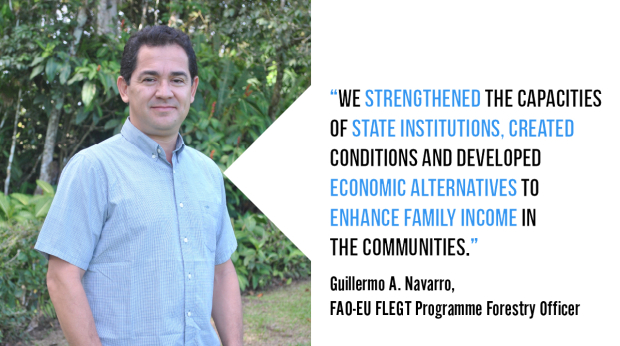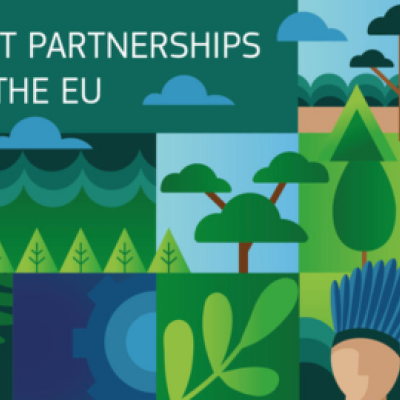Este artículo también está disponible en Español.
Illegal logging is a global problem with significant negative economic, environmental, and social impacts1. Partner countries around the world, including in the Latin America region, have taken action and introduced measures to tackle illegal logging and mitigate its environmental and socio-economic repercussions. In this process, the EU stands as a partner via numerous interventions in forest-rich countries of Latin America, with Guatemala exemplifying these efforts.
The EU's policy to fight illegal logging and associated trade was defined back in 2003 with the Forest Law Enforcement Governance and Trade (FLEGT) Action Plan. Countries targeted in the Plan, which contain nearly 60% of the world's forest, supply a large proportion of internationally traded timber2. Tropical South America is among the key regions of the action plan.
In support of the European Commission's Action Plan on FLEGT, the FAO-EU Forest Law Enforcement, Governance and Trade (FLEGT) Programme aims to reduce illegal logging, improve forest governance, and promote the legal production and consumption of timber. This is achieved by providing small grants and technical assistance to forest-sector stakeholders.
A success story: the role of cooperatives in Guatemala
The FAO-EU FLEGT programme has supported 126 projects in Latin America in the last five years. Guatemala is a good example of the tangible results generated by the Programme. A large share of the country's timber harvesting takes place in the northern department of Petén, where the forests are renowned for their high biodiversity value3. Most of what ends up on the market are raw materials, though, without added economic value. The legal timber market struggles to compete with the demand for illegal timber. Buyers, including carpenters, end up having limited access to adequate amounts of legal timber and are often left with no choice but to purchase illegally harvested wood.
The FAO-EU FLEGT Programme supported Asociación Balam to reverse this situation in Petén. Recognising the challenges faced by carpenters and other micro, small and medium enterprises (MSMEs) in the wood industry, Asociación Balam worked to increase access to legal timber. This was achieved by supporting and strengthening project beneficiaries such as Bosque y Vida, a carpenters cooperative comprising 32 members. Bosque y Vida signed an agreement with Cooperativa Carmelita, another cooperative in Petén, managing a forest concession producing legally and certified harvested lumber. A lumber depot was established, enabling local carpenters to purchase legal timber through cooperatives which, in return, receive tax benefits. In this way, the price of legal wood can compete against the price of illegal wood.
In promoting environmental governance, it was essential to foster collaboration between the wood industry of the Maya Biosphere Reserve and the carpenters of the Municipality of Poptún, Petén in what is called - according to Asociación Balam - "a solidarity and environmentally sustainable wood market."
Lessons learnt from the FAO-EU FLEGT Programme in Guatemala:
1. Organise and build the capacities of MSMEs
Unorganised, informal communities and actors are vulnerable and susceptible to illegal timber trafficking, whereas formal, organised, and trained MSMEs are better suited to taking advantage of sustainable economic opportunities. That is why, in addition to strengthening cooperatives, the programme worked towards organising MSMEs in administration, management, marketing, and commerce. The case of Cooperativa Carmelita serves as an example. Guillermo A. Navarro, FAO-EU FLEGT Programme Forestry Officer, explains that "Cooperativa Carmelita has been producing and exporting wood for more than 20 years. During that time, they have also received support on improving wood processing and commercialisation. The cooperative previously exported wood only from the tree trunk. Now, they have improved their production yield by using and marketing wood coming from branches as well those that used to be left behind in the forest harvesting process."
However, working with MSMEs is the outcome of meeting particular prerequisites. As Guillermo A. Navarro says, "it requires the combination of various policy and market instruments related to legality access, training, organisation, formalisation, access to legal wood markets and commercialisation support."
2. Decentralise & build the capacities of local authorities
Transferring management capacities so that locals are the owners of their development is another lesson learnt from this project. Weak governance in forested areas for conservation has been a central challenge as the state has witnessed difficulties in enforcing the law and controlling illegal activities.. Therefore, communities are vulnerable to illicit traffickers of natural resources (wood, wildlife, etc.), leaving them with few options for economic-productive activities, often resulting in a perverse relationship of poverty and organised crime.

As Guillermo A. Navarro mentions, "the way to deal with it was, on the one hand, to strengthen the capacities of state institutions to improve their institutional presence and, on the other, to create conditions and develop economic alternatives that will enhance family income in the communities."
Asociación Balam delivered training to municipal forest officials in collaboration with the Municipality of Poptún, Petén and the National Institute of Forests (Instituto Nacional de Bosques, INAB). The training courses focused on the delivery of licenses for household harvesting permits and how to better support the development of forest management plans, including through tax incentives. Based on figures provided by INAB, the area under forest management plans in Poptún increased from 891.58 hectares to 16,509.41 hectares as a result of the training. By creating these forest management plans and increasing the number of household harvesting permits, these forest governance processes contribute to sustainable forest management and to improving the supply of legal timber to local MSMEs.
3. Choose the right partners
One factor contributing to the success of the FLEGT Programme was selecting a trustworthy partner with proven capacity to deliver, in this case, Asociación Balam. Partners must be familiar with the local context, the challenges, and the opportunities that arise. If these people also enjoy the benefits of credibility, they have the required legitimacy for leading policy and governance initiatives4.

Daniel Herrera Trujillo, Project Technical Coordinator, refers to the work and impact of Asociación Balam: "We promote integral rura development, and we have a positive impact on the formulation of national and local policies as well as international collaboration between Guatemala, Belize, and Mexico."
However, Guillermo A. Navarro warns that "partners, like Asociación Balam, should not take part in forest control action directly when some communities and actors are participating in illegal trafficking. This is especially true if these actors were engaged as beneficiaries in a technical assistance project to develop legal economic-productive alternatives. This would generate mistrust in the communities or actors and put the technical personnel of the service providers at risk. It is essential that the technical staff of partners only transfer capacities, advise, and facilitate coordination with government institutions in charge of this control action."
Impact beyond Petén
The success of the project in Petén generated interest among carpenters and other wood producers in different regions of Guatemala. Many of these MSMEs are informal and inspired by the project, and they believe that organisational strengthening and formalisation will increase market opportunities and productivity in their regions. Given this interest, Asociación Balam worked with Bosque y Vida to develop a strategy for identifying new partnerships to transform and commercialise legal timber. By sharing their experiences and learning with other groups in the region, they will encourage sustainable practices across the timber supply chains. With the Guatemalan government recognising the immense socio-economic value of forests and the importance of their protection, it is crucial to ensure that authorities are well-equipped to assist MSMEs in complying with legal requirements.
Click on the play button below to watch our video about the FAO-EU Forest Law Enforcement, Governance and Trade (FLEGT) Programme.
Have you been involved in relevant interventions for the promotion of legal timber trade and sustainable forest governance?
What was your approach?
Did you meet any challenges, and how did you address them?
Leave your comment below!
|
About the FAO-EU FLEGT Programme
|
Credit: Video © Capacity4dev | Photo © European Union
Resources
- FAO-EU FLEGT Programme
- FAO-EU FLEGT Programme: Success Stories
- Work Plan 2018-2022 for the implementation of the FLEGT Action Plan
- FLEGT Regulation — FLEGT Voluntary Partnership Agreements (VPAs)
- Forestry-related multilateral environmental agreements and processes
- European Commission, DG ENV - Forests – Illegal Logging
- Communication from the Commission to the Council and the European Parliament – Forest Law Enforcement, Governance, and Trade (FLEGT) – Proposal for an EU Action Plan, 2003
1 Illegal logging is the harvesting of timber in contravention of the laws and regulations of the country of harvest. In economic terms it results in lost revenues and other foregone benefits. In environmental terms, illegal logging is associated with deforestation, climate change and a loss of biodiversity, whereas in social terms it can be linked to the following: conflicts over land and resources, the disempowerment of local and indigenous communities, corruption and armed conflicts. Illegal activities also undermine the efforts of responsible operators by making available cheaper but illegal timber and timber products in the marketplace.
2 For more information, check here.
3 In particular, these forests contain some 300 species of trees (Instituto Nacional de Bosques, INAB, 2012).
4 Asociación Balam's projects have been focused on establishing and consolidating multisectoral strategic alliances and strengthening local actors with the transfer of management capacities and public participation. For environmental protection, its role has been essential in facilitating coordination with government entities, civil society organisations, private initiatives, and local governments (mayors) in the Forestry Technical Commission of the Intersectoral Table for Land and Environment (MITA).





Log in with your EU Login account to post or comment on the platform.